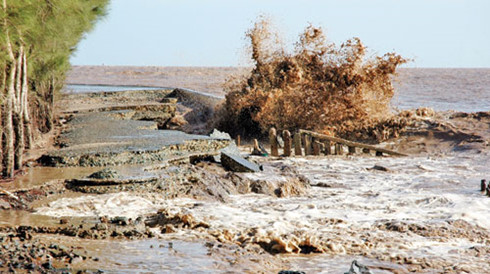Vietnam begins implementing Paris climate-change pact
Speaking with reporters at a conference on October 25 in Hanoi convened for the express purpose of laying out a roadmap to implement the accord, Deputy Prime Minister Trinh Dinh Dung, said it was a great day for Vietnam.
Mr Dung, who serves as the vice chair of National Committee on Climate Change, assured reporters that Vietnam is going to aggressively take practical actions to tackle climate change and grow the economy.
 |
It’s all about the future for our children and grandchildren, Mr Dung proclaimed.
What we are putting in place at the conference in Hanoi is a framework for which we, specking collectively as a nation, can save ourselves from the negative impacts of a warming world.
We have committed ourselves to trying to avoid more than a one and one-half-degree Celsius increase in the global average temperature. It is essential that we stay well below two degrees, he noted.
This is a momentous occasion, exclaimed Minister Tran Hong Ha of the Ministry of Natural Resources and Environment.
What once seemed unimaginable, is now unstoppable, he quipped, noting that strong international support for the Paris Agreement entering force is a testament to the urgency for action.
It reflects the general consensus of governments around the globe that robust cooperation, grounded in systematic national action, is essential to meet the climate challenges.
But he warned that much work to giving the agreement effect still lays ahead. Now we must move beyond words and translate them into actionable deeds and breathe life into the Paris accord.
We need everyone pitching in to do their part – every part of Vietnamese society must be mobilized and actions coordinated in a concerted effort to reduce emissions and help communities adapt to inevitable climate impacts, he stressed.
Adopted in Paris by the 195 Parties to the UN Framework Convention on Climate Change (UNFCCC) at a conference known as COP21 this past December, the Agreement calls on countries to combat climate change and to accelerate and intensify the actions and investments needed for a sustainable low-carbon future, as well as to adapt to the increasing impacts of climate change.
Specifically, it seeks to limit global temperature rise to well below two degrees Celsius, and to strive for at least a one and one-half degrees Celsius cap. The pact – signed in New York earlier this year on April 22 by 175 countries at the largest, single-day signing ceremony in history – enters force 30 days after at least 55 countries, accounting for 55% of global greenhouse emissions, deposit their instruments of ratification, acceptance or accession with the Secretary-General.
That requirement was satisfied this past October 5 when Austria, Bolivia, Canada, France, Germany, Hungary, Malta, Nepal, Portugal and Slovakia, as well as the EU, deposited their instruments of ratification with the Secretary-General.
The Agreement now enters force in time for the Climate Conference (COP 22) in Morocco in November, where countries convene the first Meeting of the Parties to the Agreement.
Countries that have not yet completed all the formal steps to acceptance may participate as observers.
Specifically, the accord calls on countries to combat climate change and to accelerate and intensify the actions and investments needed for a sustainable low-carbon future, and to adapt to the increasing impacts of climate change.
In addition, it aims to strengthen the ability of countries to deal with the impacts of climate change. It calls for appropriate financial flows with higher income nations providing much needed support for those with lower finances.
It also targets a new technology and an enhanced capacity-building framework to support action by developing countries and the most vulnerable countries in line with their own national objectives.
Enhanced transparency of action and support through a more robust framework, are also among the key aims.

